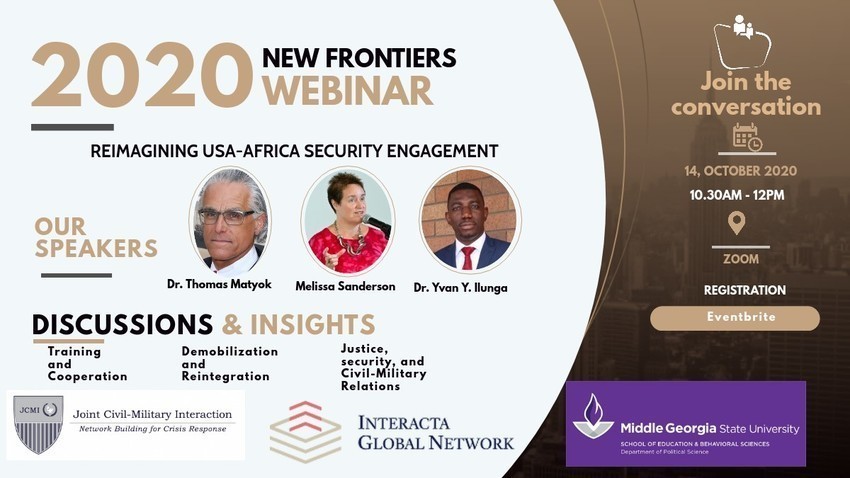
JCMI WORKSHOP NOTE
The Fall 2020 JCMI webinar workshop on reimagining US-AFRICA security engagement was a timely workshop that added a brick to the ongoing conversation about the US Foreign policy and reengagement with Africa in the age of global competitiveness with China and Russia.
The workshop (webinar) used a conversational approach on the subject, and intended to navigate the policy, academic and practice realm.
Starting off, the opening address was made by Dr. Thomas Matyok who established the context of the workshop and its critical positioning within the study, practice and conduct of Civil-Military relations as championed by the Joint Civil Military Interaction (JCMI) network. Dr. Christopher Lawrence, the chair of the political science department at Middle State Georgia University (MSGU) whose department hosted the event explained how Africa was a region of academic interest to his department, and therefore such conversation was critical to the advancement of academic training and research of students at MSGU.
Following these opening remarks, the panel composed by Ms. Melissa Sanderson and Dr. Yvan Yenda Ilunga, discussed the dynamics of security and piece in Africa and the areas in which the US-Africa security engagement was deemed critical.
Some of the observation and recommendations where that;
- The need for security cooperation with African counterparts should go beyond the core security approach. There is a need to focus on economic inequalities among some minority tribes and communities. In fact, while the politics at the national levels continue to be classic in nature (tension, conflict, negotiation, etc.), insecurities are mostly fueled by local frustrations and lack of access to sustainable livelihood.
- Establishing the undeniable fact that there is no peace without justice, mechanism of cooperation should focus on addressing roots causes of fragility by making sure that violence against women, girls and boys, as well as the practice of rape as weapon of war are addressed as one of the top priorities. The gender aspect in security cooperation should be a focus, not just a policy narrative.
- Beyond trainings, the US should encourage and support the DDR effort in post conflicts countries such as South Sudan and the Democratic Republic of Congo. Beyond the traditional DDR strategy, panelist suggested that the component of ‘service’ be added to the framework as a mean of reparation and rebuilding trust with local communities by former armed groups members.
- The US should shift its security approach toward Africa by avoiding articulating it based on competition with China and Russia. African nations would be more willing to engage in a win-win strategic partnership with the US based on mutual interests, rather than strategies to counter the China’s expansionist approach.
- Over the years, there has been a clear lack of sustained political engagement with the continent. This should not be the case on the security front where the growing threats of terrorism and ideological wars constitute an important destabilizing factor for both US national security and African prosperity.
- The time for honest dialogue with Africa based upon respect and cultural sensitivity is also a critical angle to be considered.
- While the sovereignty of many countries in Africa is at stake, it is important that the US engages in a manner that ensure stability, national sovereignty and less interferences in issues that could frustrate and give China and other competitors political advantages.
- Both the continent of Africa and the US could maximize on this partnership if sustainable strategies based on the viability of institutions and accountability of their actors constitute of the pillars of their actions.
